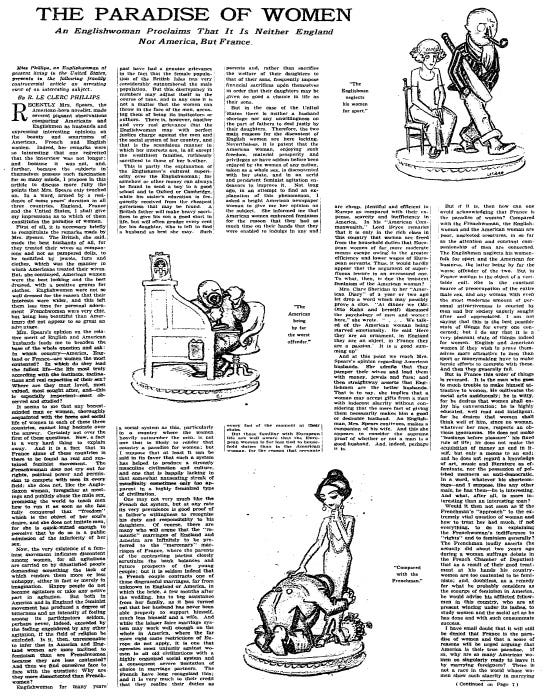The Paradise of Women
Which was the best place for women to live in 1924: the U.S., the U.K., or France? In a 1924 New York Times Magazine article, R. Le Clerc Philips — a British woman living in America — argued France.
Her argument was essentially: look at where the women are advocating for change.
In France alone of these countries is there to be found no real and sustained feminist movement. The Frenchwoman does not cry out for rights, political power, and permission to compete with men in every field.
...
Now, the very existence of a feminist movement indicates discontent among women, for all agitations are carried on by dissatisfied people demanding something the lack of which renders them more or less unhappy, either in fact or merely in imagination. Happy people do not become agitators or take any active part in agitation.
At the time this article was written, the U.S. was the only one with women's suffrage.
U.S. women were granted the right to vote in 1920, through the Constitution's 19th Amendment. In the U.K., though, women wouldn't be granted the right to vote until 1928, with the Representation of the People Act of 1928. Meanwhile, French women weren't granted the right to vote until 1944.
Phillips went on to ask:
Is it, then, unreasonable to infer that in America and England women are more inclined to feminism than are Frenchwomen because they are less contented? And thus we find ourselves face to face with the question: Why are they more discontented than Frenchwomen?
Phillips went on to postulate several reasons, one of which was that the American men weren't good-looking enough. Seriously.
The American man stands the best chance of getting a good-looking wife, with the Englishman next and the Frenchman last. But the American woman does not stand an equal chance of getting a handsome husband, since the English woman is an easy winner in this respect, with probably the French woman next. Uncle Sam was more than generous to his daughters when he dealt out the gift of personal beauty, but, alas, he was very niggardly to his sons.
("Niggardly" is an old word meaning "stingy," with no overt racial connotations. Google Books Ngram Viewer shows its use in writing has plummeted since 1924, for obvious reasons — although even by 1924, it was down considerably from its 19th century peak.)
As for where the best country is for women in 2024, I'll leave that for others to decide.


